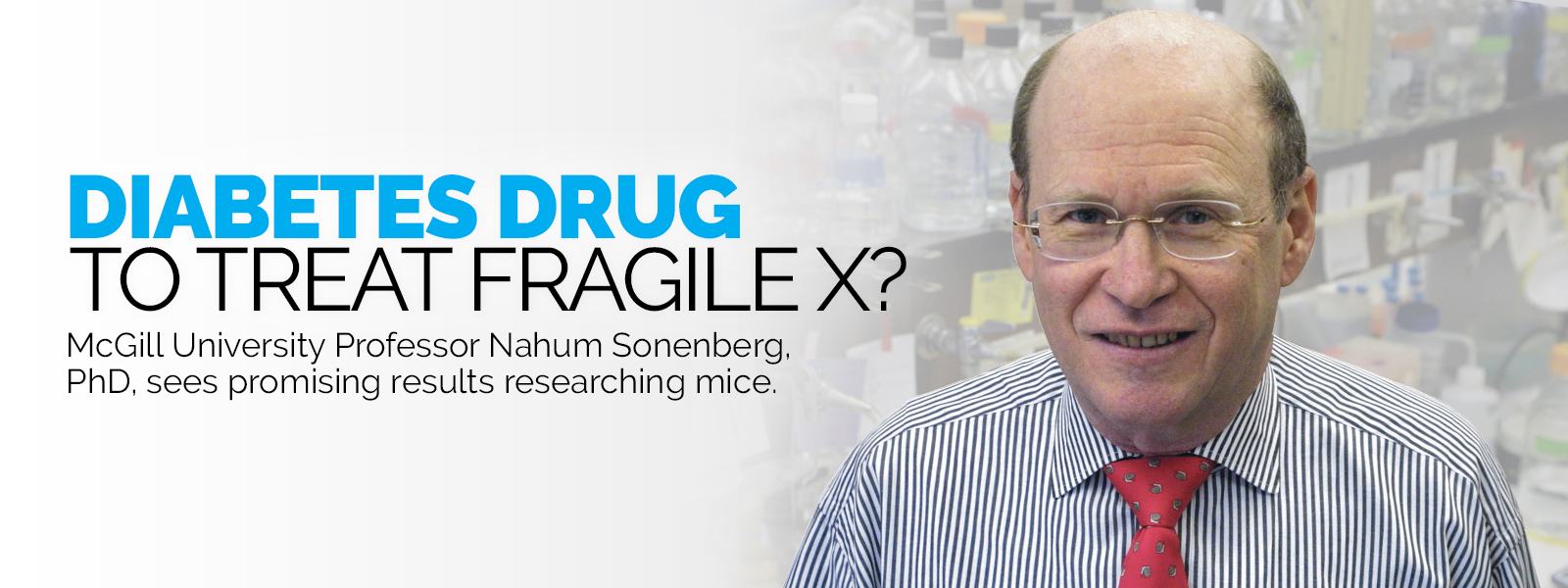
McGill University Professor Nahum Sonenberg, PhD, sees promising results researching mice
Diabetes and Fragile X syndrome may someday have something in common.
Diabetes is manageable and so could be Fragile X syndrome.
Treatable.
And, yes, even curable — potentially.
All depends on the ability to create the right combination of medicines through painstaking, disciplined and comprehensive research efforts, says Nahum Sonenberg, PhD, James McGill Professor, Department of Biochemistry, McGill Cancer Center, McGill University.
Dr. Sonenberg is leading a team of researchers at McGill, in Montreal, Canada, which conducts research on the mechanism and control of translation (protein synthesis) initiation in eukaryotes (organisms whose cells contain a nucleus). Their goals are to understand the dysregulation of translation in those with Fragile X syndrome, cancer, autism, neurodegenerative disease, and virus infections.
“If we understand this, we can devise drugs to cure many diseases,” said Dr. Sonenberg, who earned a PhD in biochemistry at the Weizmann Institute of Science, Israel. “In 20-30 years, we could change the outcome of many diseases.”
Regulating Protein Synthesis is Key
Key to Fragile X research success will be regulating the amount of specific proteins in cells.
“All organisms need to make an exact amount of protein in each of our cells to live and survive,” Dr. Sonenberg said. “We cannot make too much or too little. In children with Fragile X, MMP9 is a protein that is elevated. If we can inhibit this process, we will get less MMP9, normalize the brain and cure Fragile X.”
If all goes well in human trials, Dr. Sonenberg expects treatment in patients with Fragile X will go as well as for those taking diabetes medicine today. Likely benefits will be improved behavior, social interaction, sleep and cognition, and less hyper excitability.
“This will be a tremendous achievement,” he said. “So promising.”
Eliminating Side Effects for Clinical Trials
One of the biggest obstacles to human clinical trials is limiting or eliminating side effects of drugs used.
“Ideally, we are looking for a medicine that would not have any,” Dr. Sonenberg said. “Metformin is an oral diabetes medicine that helps control blood sugar levels and is the most prescribed drug for diabetes. It reduces the amount of MMP9. We treated mice with metformin and corrected all the core Fragile X deficits. We are optimistic about using metformin in human clinical trials. This is a generic drug with few side effects.”
Fragile X Research is Rewarding
Dr. Sonenberg says FRAXA is an amazing organization because it simplifies the process of asking for grant money and organizes Fragile X research conferences that are invaluable in advancing progress.
He wishes more organizations were like FRAXA.
“If they were, Fragile X would have already been cured,” he said. “FRAXA has given us tremendous monetary support. I wish all grant writing was this easy. You cannot do better.”
Dr. Sonenberg was awarded the Robert L. Noble Prize from the National Cancer Institute of Canada in 2002, the Killam Prize for Health Sciences in 2005, the Katharine Berkan Judd Award from Memorial Sloan Kettering Cancer Center in 2007, the Roche Diagnostics Award in 2007, the Gairdner International Award in 2008, the CIHR Health Researcher of the Year Award in biomedical and clinical research in 2009, the Centenary Award of the Biochemical Society (UK) in 2011, the Lewis S. Rosenstiel Award for Distinguished Work in Basic Medical Science in 2012, and the Wolf Prize in Medicine in 2014.
He says research on Fragile X syndrome has been very rewarding.
“It makes me happier to do something to cure people of this devastating disease,” he said. “It gives a sense of purpose. It’s more important to make life better for others with this disease.”
Written by
Theodore Coutilish, MA
FRAXA Board Member
Theodore Coutilish a distinguished leader in marketing communications, serves as the Assistant Director of Strategic Engagement and Communications at the University of Michigan. Dedicated to advancing Fragile X research and awareness, he has long advocated for this cause, motivated by his son, Andrew, who has Fragile X syndrome. Residing in Grosse Pointe Shores, Michigan, with his wife, Mary Beth Langan, Theodore earned a BA in Print Journalism from Wayne State University and an MA in Communications from the University of Detroit Mercy.


